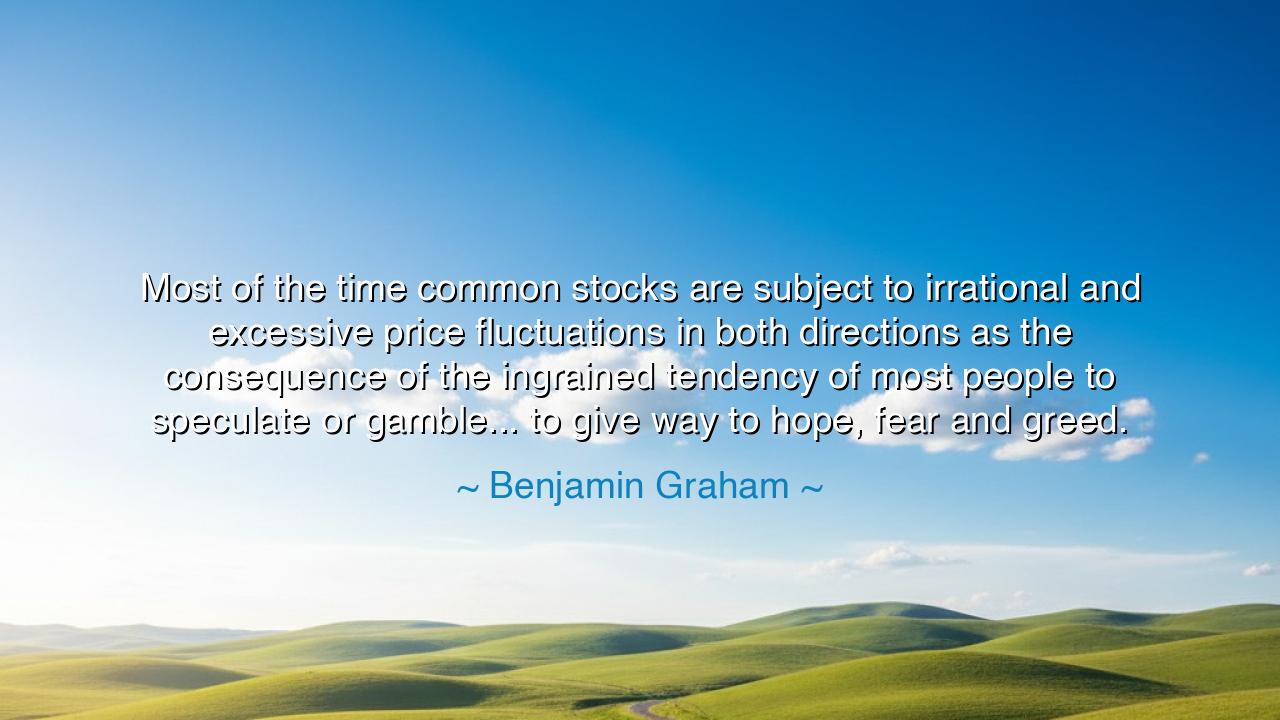
Most of the time common stocks are subject to irrational and
Most of the time common stocks are subject to irrational and excessive price fluctuations in both directions as the consequence of the ingrained tendency of most people to speculate or gamble... to give way to hope, fear and greed.






The great sage of finance, Benjamin Graham, whose teachings laid the foundation of modern investing, once declared: “Most of the time common stocks are subject to irrational and excessive price fluctuations in both directions as the consequence of the ingrained tendency of most people to speculate or gamble… to give way to hope, fear and greed.” Though spoken in the language of markets, this truth is not confined to commerce—it is a mirror of the human soul. In his words lies an ancient wisdom: that emotion, not reason, governs the crowd, and that fortune favors not the boldest heart, but the calmest mind.
In this saying, Graham does not merely describe the movement of markets; he reveals the nature of human behavior itself. The rise and fall of prices are but reflections of our inner storms—the restless waves of hope, fear, and greed that sway the judgment of even the wise. When prices soar, men are seized by the fever of hope, believing the ascent will never end. When prices fall, they are paralyzed by fear, seeing in every shadow the specter of ruin. And in both moments, they are led astray by greed, that ancient hunger which blinds the spirit and deafens the mind. Thus, the marketplace becomes not a temple of reason, but a theater of emotion, where humanity’s oldest impulses dance beneath the guise of rational choice.
The origin of Graham’s wisdom was born not in ease, but in experience—from the ashes of the Great Depression, when wealth and pride alike crumbled into dust. Having witnessed the ruin of countless investors who chased illusion instead of truth, he learned that the greatest enemy of prosperity was not misfortune, but self-deception. The market, he taught, is a living creature named Mr. Market, sometimes exuberant, sometimes despairing, but always emotional. The wise investor treats this creature not as a guide, but as a servant—buying when he is despondent, selling when he is euphoric, and never allowing himself to be carried away by his moods. To follow this discipline is to practice the art of temperance, one of the ancient virtues.
History offers many examples of those who failed to heed this wisdom. In the year 1637, the Dutch Republic witnessed the madness of the Tulip Mania, when the price of a single tulip bulb soared higher than the cost of a house. Ordinary men and women, drunk on the promise of easy wealth, abandoned reason and wagered their fortunes on flowers. But when the illusion broke, ruin swept across the land. Centuries later, in the modern age, the same spirit returned in new disguises—dot-com bubbles, housing booms, and frenzies of speculation. The names changed, but the root remained the same: the ingrained tendency to gamble under the spell of greed and fear.
To master these forces, Graham’s teaching demands a higher discipline—the cultivation of emotional intelligence before financial intelligence. He reminds us that true wealth lies not in predicting the winds of fortune, but in steering steadily through them. The wise must be patient when others panic, and skeptical when others boast. They must measure value not by price, but by substance, and must see in every storm an opportunity to act with calm and conviction. For the market, like life itself, tests not the clever, but the steadfast.
The deeper message of Graham’s quote reaches beyond investing: it speaks to the eternal conflict between reason and emotion. In every realm—politics, love, ambition, and art—men rise and fall not by circumstance alone, but by how they govern their own passions. To “give way to hope, fear, and greed” is to surrender to chaos; to master them is to approach wisdom. The ancients taught the same lesson in different tongues: the Stoics urged control over impulse; the Buddhists warned against attachment; and Christ himself cautioned against the deceit of earthly treasures. Graham, in his quiet way, carried that ancient torch into the modern world.
So, my child, remember this teaching: whether you trade in gold or in deeds, be not ruled by the fever of the crowd. When others are shouting, be silent. When others are trembling, stand firm. Let your heart be anchored in reason, and your decisions flow from patience and understanding. For in a world driven by speculation, the greatest profit is self-mastery. As Benjamin Graham revealed, it is not the storms of the market that destroy a man, but the tempests of his own soul—and he who conquers those tempests, even once, has already found the truest form of wealth.






AAdministratorAdministrator
Welcome, honored guests. Please leave a comment, we will respond soon